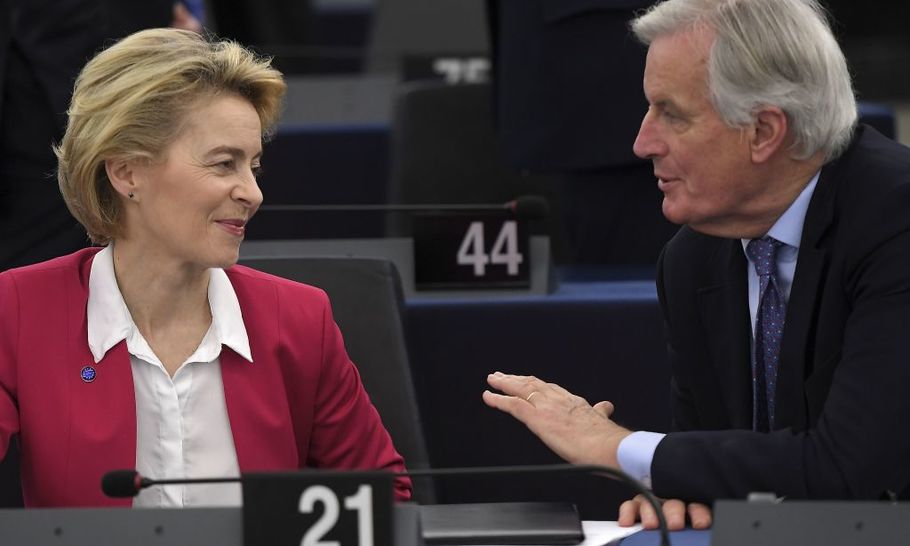Brexit is happening. When is the EU going to wake up and smell the coffee?

Ursula von der Leyen with Michel Barnier (Frederick Florin/AFP via Getty Images)
Brexit is no longer news. It is a sign of how rapidly politics can change that the passage of the Withdrawal Agreement Bill this week has barely registered. On third reading in the Commons, the Government had a majority of 99: significantly larger than the 80 it could normally expect. After all the Sturm und Drang of the last four years, Britain’s departure from the EU at the end of this month will barely elicit a shrug.
The fact that Brexit is now taken as read does not, of course, mean that everyone is reconciled to it. There is still an assumption, at least on one side of the argument, that the only people who care about Europe are those who fought for the EU in the Lords and in the Commons, on College Green and in the green rooms of Broadcasting House, who said they would never surrender — until, on Friday 13th of December, they did.
But this assumption is actually highly presumptuous. Many of the leading Brexiteers have always not only loved Europe but been among the most knowledgeable about it.
Take historians, for example. The founder of Ukip — in the days before it became a vehicle for Nigel Farage’s ambitions — was Professor Alan Sked, a pupil of AJP Taylor and leading authority on the Habsburg Empire. Among the historians who have advocated Brexit are Professors David Abulafia (expert on medieval Europe and global maritime history), Jeremy Black (author of more than a hundred books on almost everything, Europe included) and the late Norman Stone (who lived and breathed European culture, found British universities too provincial and died in Budapest).
One of the most polymathic and polyglot scholars of our time is Sir Noel Malcolm, whose latest book Useful Enemies: Islam and the Ottoman Empire in Western Political Thought, 1450-1750, is not only staggeringly erudite but highly relevant to the present-day encounter between Europe and the Islamic world. Sir Noel has repeatedly taken to task those who claim to represent British universities, such as Universities UK and the Russell Group, for exaggerating the negative consequences of Brexit. He also exposed the dubious claims of Cambridge University, including one that foreign students faced an “uncertain future”, despite the Government having guaranteed their post-Brexit status.
Nevertheless, as Denis MacShane reported here in TheArticle, when Ursula von der Leyen gave a speech at the London School of Economics this week, the new President of the European Commission was given a rapturous reception by LSE academics and alumni. When Michel Barnier, the EU’s chief Brexit negotiator, stood up too, the audience gave him a “huge cheer”. EU officials evidently enjoy heroic status in some of our leading academic institutions.
The message which Mrs von der Leyen had come to convey, however, was that the UK would have to continue to abide by EU law — including freedom of movement — if it hoped to reach a decent trade agreement. She and Barnier agreed that even on that basis there was no chance of such a deal within the timeframe of 11 months proposed by the Government.
The message, in other words, was: play by our rules and our timetable. This is the language, not of compromise, but of diktat. Despite Mrs von der Leyen’s attitude, Boris Johnson welcomed her to 10 Downing Street in typically jovial spirit. The two have something in common, after all: both spent much of their childhood in Brussels. Stanley Johnson was an MEP; Ernst Albrecht (the Commission President’s father) was an EU civil servant.
There is, in fact, nothing to choose between the European credentials of these two politicians. The Prime Minister can recite chunks of the Iliad in Greek and has written a book on the original EU, the Roman Empire. Mrs von der Leyen is an alumna of the LSE and in her speech quoted Winston Churchill as an EU founding father who called for a “United States of Europe” in his 1946 Zürich speech. As a biographer of Churchill, Boris Johnson will have been able to match her quote with another: “We are with Europe, but not of it,” Churchill wrote. “We are linked but not comprised.”
That is, more or less, the relationship that the British have now voted for three times, in the 2016 referendum and two general elections: first in 2017 and again less than a month ago. Mrs von der Leyen, for whom nobody actually voted as Commission President, needs to take this democratic decision on board. She should stop listening to the adulation of academics who represent only themselves and start listening to one of the few leaders in Europe who enjoys a strong majority.
The sooner that a trade agreement is reached, at least in principle, the sooner the UK and the EU can move on to rebuild a relationship of which the prime beneficiary has been the Continent. As she cheerfully admitted, the Single Market was largely a British invention — though she failed to give the main credit for it to Margaret Thatcher, without whom the historic protectionism of Continental Europe would never have been overcome.
If they really believe that Europe needs Britain as much as Britain needs Europe, then Ursula von der Leyen and Michel Barnier need to change their tone. They will find that Boris Johnson is eager and willing to do a deal. But if they refuse to compromise, he is also strong enough to walk away. Brexit is happening. It’s time for the EU to wake up and smell the coffee.





